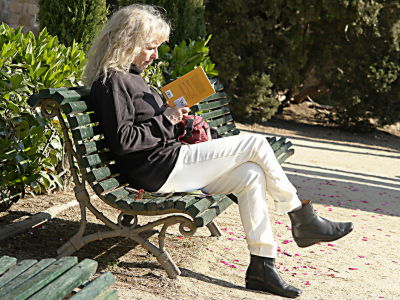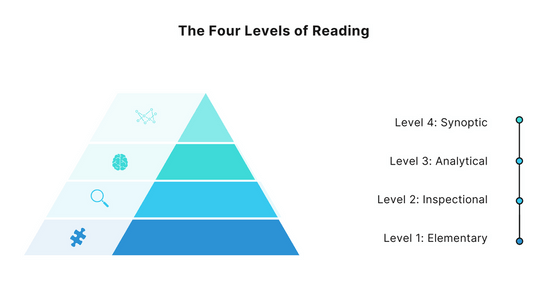Three goals and four steps for efficient and effective reading

Past research has shown that
The Art of Reading More Effectively and Efficiently
https://aliabdaal.com/read-more-effectively/
◆Set a reading purpose
J.K. Rowling , author of the Harry Potter series, which Abdaal says is his favorite book, once said, 'Sometimes something magical happens when you read a good book.' While there are certainly many enjoyable and meaningful aspects to reading, talking about only abstract benefits can be hard to motivate. Abdaal advises that dividing your purpose for reading into the following three categories can make it easier to get started reading.
1: Reading for fun
This is literally reading for pleasure, so there are no rules or complicated theories. Abdaal says, 'The goal is simple: just relax and immerse yourself in the story. There's nothing wrong with reading for the sole purpose of entertaining yourself.'
A 2009 study also found that reading is an excellent way to relieve stress.
Research shows that reading is highly effective in relieving stress - GIGAZINE

2: Reading for information
Books in this category are designed to teach you specific facts or information. Many of these books have a simple layout and chapter structure, making it easy to find what you're looking for.
Abdaal explains the key to getting information from books: 'A clear index and layout help you find the parts that interest you without losing track of the main points, and you can consume the book as a reading material. The goal here is to 'learn without judging.' Whether it's a newspaper or a tourist guide, you might enjoy reading individual articles, but you should keep in mind that you're reading to gain knowledge about current events or a specific place.'
3: Reading for understanding
Books in this category differ from those mentioned above in that they involve the cognitive effort of 'understanding things,' rather than simply absorbing knowledge without judgment. 'Reading to understand' is unavoidable if you want to grow through reading, but it can also be frustrating because the content is often difficult to understand right away or contains facts that are hard to accept.
Abdaal explains that by gradually becoming accustomed to reading by following the next point, 'The Four Steps of Reading,' you can develop an attitude toward reading books.
◆Four steps to reading
The three categories above are for setting reading goals, while the reading steps are for developing a reading style. Specifically, as shown in the diagram below, the four stages are 'Basic,' 'Probing,' 'Analytical,' and ' Syntopical .'

1: Basics
The 'basics' are reading normally, like when you learned to read in school, and getting a good grasp of the content. The key here is to avoid speed reading in the pursuit of efficient reading. 'While it's certainly important to improve productivity, trying to increase your reading speed before mastering effective reading will only impair your ability to acquire new knowledge. If you want to read efficiently, you need to master the next skill, 'scrutiny,' before increasing your speed,' Abdaal said.
2: Scrutiny
The important thing about 'scrutiny' is to 'understand the overall flow of the book and grasp the overall picture the author is trying to paint before reading.' Abdaal believes that you should have the content and main points of the book in mind before digging into the content of the book.
'Scrutiny' has two aspects: 'outline' and 'surface.' In 'outline,' you first quickly read the book's title, cover, and table of contents to understand what the book is about. Next, check the introduction and conclusion of each chapter, and if there are any headings that interest you, read those as well. In the next step, 'surface,' you skim through the book without any consideration or analysis. These two steps of 'scrutiny' are necessary to determine whether the book is worth moving on to the next step, 'analysis.'
When it comes to determining whether a book is worth reading, Abdaal said, 'Sometimes you come across a good book at the wrong time. If it doesn't interest you now, don't force yourself to read it. You can always come back and read it again.'
3: Analysis
'Analysis' is the process of thoroughly understanding a book by identifying its core content and evaluating the author's arguments. To do this, you need to ask the core of the book in three points:
What is the book trying to say overall?
What exactly does the book say?
Is that at least partially true?
The 'analysis' stage is similar to the previous 'scrutiny' stage, but here we focus on the questions the author is asking and, conversely, the answers they are trying to give. Next, after understanding the author's arguments and thoughts, we determine whether their content is correct.
As a tip for understanding the author's argument, Abdaal quoted a quote by American philosopher

◆4: Syntopical
'Syntopical' is a term coined by Adler, and it means comparative reading of different works. While steps 1 to 3 of reading focused on specific books, syntopical reading deepens your understanding of the entire field by understanding how different books dealing with the same theme are connected.
To read syntopically, first make a list of books that discuss a particular topic that you think are particularly relevant. Next, read the books on the list up to the 'analysis' step, and then define the common themes in your mind as keywords. Then, identify the biggest questions and answers that the books address, and examine each author's arguments.
Abdaal quoted Apple founder Steve Jobs as saying, 'Creativity is nothing but connecting things.' He added, 'Syntopical reading connects ideas on a particular subject. This is groundbreaking, acting as a powerful medium for creative solutions and true insights.'
What to do if you can't keep reading
Even if you put the above methods into practice and acquire the skill of reading books, if you don't keep it up, it's all for naught. Abdaal's advice to address the problem of not being able to make reading a habit is to 'read what you like until you start to like reading.' He also said that using a Kindle or a reading app to make reading easy or to publicly proclaim 'I like reading' and put pressure on yourself can also be effective.
At the end, Abdaal said, 'Reading books is hard work, but it's an essential skill if you want to gain knowledge and be able to come up with impactful ideas. If you can acquire it, I promise it will be the biggest factor in changing your life,' and strongly recommended acquiring reading skills.
Related Posts:






